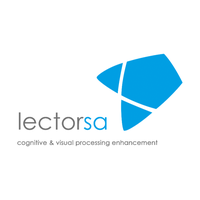"We are a dynamic third-generation family-based enterprise with more than 30 years’ research, development and implementation expertise. We work with specialist teams to deliver first-to-market solutions grounded in scientific research with precision-developed algorithms, embedded in the newest technology available. We launched LAB-on-line in 2011. LAB-on-line has assisted more than 120 000 users in maximizing and improving their skills and in thriving in an ever-changing world. 2020 saw the launch of the ALL-NEW integrated Desktop APP Eyebraingym, taking visual processing, reading and cognitive development to a whole new level. South African schools and educational institutions can apply for an education grant from our partners and receive up to 90% off the cost to implement our solutions at their schools. The online Place me evaluation module (including a visual, language proficiency and reading with comprehension eval) is available FREE on the eyebraingym website."
Lectorsa is a dynamic team geared to towards improving outcomes of SDG 4.
Good education outcomes ensure macro-economic stability; ignite inclusive growth, and advance a country’s ability to be globally competitive. Improved education outcomes also lead to an increase in tax revenue and GDP. It lessens the demand on social, health and safety services. It contributes to low levels of crime and improved health.
If we want to improve educational outcomes, a variety of aspects need to be dealt with. Enabling our communities to become life-long learners through improved visual intelligence is pivotal in this endeavour. Visual intelligence is the ability to process, understand and express visual information. The basis of visual intelligence is reading with adequate comprehension. Reading skills impact all aspects of learning. We will not be able to reach real equity in education if we do not empower our people to read and understand better.
We are facing a global tsunami of illiteracy. Before the impacts of the lockdown due to the COVID-19 pandemic, over three-quarters of a billion young people in low- and middle-income countries would not have been on track to acquire necessary secondary-level skills by 2030. These young people will be unemployable due to a lack of poor skills development, of which literacy levels are the fundamental skill-set needed to be able to learn. Before the pandemic, the world was already struggling with a learning crisis. 53 per cent of children in low- and middle-income countries were already living in learning poverty, being unable to read and understand a simple text by age 10. Of these South African statistics indicate that more than 70% of 10-year-olds cannot understand what they are reading. This implies they will continue to struggle to read for the rest of their lives.
With the dawn of Industry 4.0, the need for collective intelligence has never been greater, and to achieve collective intelligence, we have to develop citizens to be visually intelligent. The most significant gap currently challenging the improvement of educational outcomes globally is the lack of capacity in our learners, students and workforce to work with visual information intelligently. To achieve this, and other SDG outcomes, the foundational skills and strategies needed for visual intelligence should receive urgent attention.
This is what we do at Lectorsa. We have researched, designed, implemented and continue to innovate, to empower our communities to become visually intelligent through proven methods imbedded into cutting edge technology. Real-time data reporting plays a big role in our systems and informs decision-making processes for governance in education.
Website
Contact Person
Minda Marshall
+27828726310
minda@lectorsa.com

